Category Archive 'Greece'
20 Jul 2014
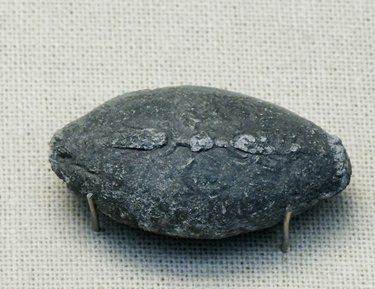
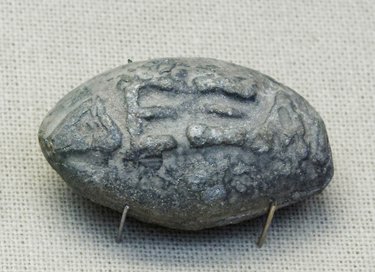
British Museum
Object type: sling-bullet
Museum number: 1851,0507.11
Description: Lead sling bullet; almond shape; a winged thunderbolt on one side and on the other, in high relief, the inscription DEXAI “Catch!”
Culture/period: Classical Greek
Date: 4thC BC
Excavated/Findspot: Athens
Materials: lead
Dimensions: Length: 43 millimetres — Weight: 105.16 grammes
23 Nov 2013

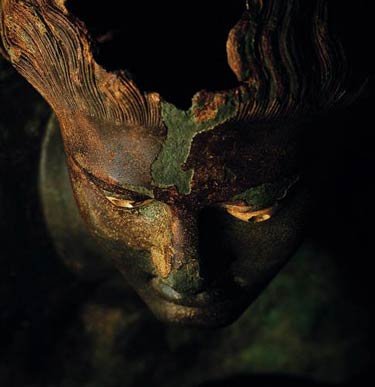
Dancing Satyr of Mazara del Vallo, fourth-century B.C., Greece
Wikipedia:
The over-lifesize Dancing Satyr of Mazara del Vallo is a Greek bronze statue, whose refinement and rapprochement with the manner of Praxiteles has made it a subject of discussion.
Though the satyr is missing both arms, one leg and its separately-cast tail (originally fixed in a surviving hole at the base of the spine), its head and torso are remarkably well-preserved despite millennia spent at the bottom of the sea. The satyr is depicted in mid-leap, head thrown back ecstatically and back arched, his hair swinging with the movement of his head. The facture is highly refined; the whites of his eyes are inlays of white alabaster.
Though some have dated it to the 4th century BCE and said it was an original work by Praxiteles or a faithful copy, it is more securely dated either to the Hellenistic period of the 3rd and 2nd centuries BCE, or possibly to the “Atticising” phase of Roman taste in the early 2nd century CE. A high percentage of lead in the bronze alloy suggests its being made in Rome itself.
The torso was recovered from the sandy sea floor at a depth of 500 m (1600 ft.) off the southwestern coast of Sicily, on the night of March 4, 1998, in the nets of the same fishing boat (operating from Mazara del Vallo, hence the sculpture’s name) that had in the previous year recovered the sculpture’s left leg. …
Restoration at the Istituto Centrale per il Restauro, Rome, included a steel armature so that the statue can be displayed upright. … [I]t is on permanent display in the Museo del Satiro in the church of Sant’Egidio.
Via Ratak Monodosico.
27 Nov 2012

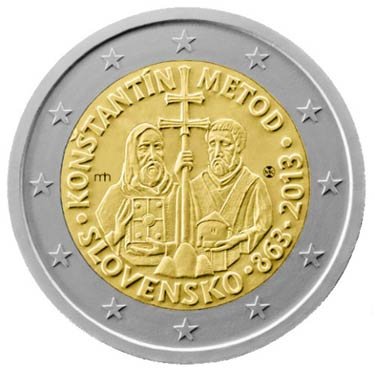
The religious-symbol-neutered version previously scheduled for production.
Original story
After strong objections by the Catholic Church which were taken up in the national parliament of Slovakia by the Christian Democratic Movement (KDH), Slovak Democratic and Christian Union (SDKÚ) and some representatives of the Ordinary People and Independent Personalities (OĽaNO) caucus to the elimination of halos from the heads of Sts. Cyril and Methodius and the removal of the image of the cross from the saints’ vestments, the Board of Directors of the National Bank of Slovakia has announced that the halos and crosses will be restored on the 2-Euro coins scheduled to be released in 2013 to commemorate the 1150th Anniversary of the Mission of Cyril and Methodius to the Slavs.
Slovak Spectator reported, however, that restoring those halos might preclude the Slovakian €2 coin being released throughout the European Union.
The NBS [National Bank of Slovakia, country’s central bank – ed. note] Bank Council approved the original proposal of the design, even though it realises that the new approval process may lead to frustrating the original goal of releasing the commemorative coin throughout the 17-nation eurozone,†said spokesperson for the bank Petra Pauerová, as quoted by TASR.
The European Commission earlier stated that the commemorative coin cannot contain crosses and halos in order to observe the principle of religious neutrality in the European Union. Later it was revealed that it was not the EC as such, but certain eurozone members that objected to releasing the coin with religious symbols.
—————————-
The same paper separately identified the countries who had a problem with Christian saints being depicted with such particularist Christian symbols as halos and crosses/
It was certain eurozone member states that expressed disagreement with the original artistic proposal for a Slovak commemorative coin depicting Saints Cyril and Methodius with crosses and halos set to be released in 2013, Andrej Králik from the Representation of the EU Commission in Slovakia said on Thursday, November 22.
The commission subsequently asked Slovakia to submit a modified proposal, which was later approved by the EU Council, Králik told the TASR newswire. He rejected statements by certain Slovak politicians who said that the case involved a ‘dictate of Brussels’ and ‘high-handedness of officials from the EU Commission’, describing these assertions as untrue and deceptive.
The commission stated that the removal of the religious symbols was due to the need to observe religious neutrality, as set out in the Charter of Fundamental Rights of the EU. German MEP Martin Kastler earlier on Thursday revealed that the countries that had raised objections to the original Slovak proposal were France and Greece
26 Jul 2012


Paraskevi Papachristou
Before the Olympics have even officially opened, a member of the Greek Olympic team, triple jumper Paraskevi Papachristou (disrespectfully referred to in hostile news accounts by the nickname “Voula”), has been removed from the team for posting a joke on Twitter.
News reports seem to indicate that her membership in an “extreme right-wing” Greek political party [highly prejudiced Wikipedia article] was an additional factor in her expulsion from the team.
The offending tweet read: With so many Africans in Greece, at least the West Nile mosquitoes will eat home made food!
The international press, including such relatively conservative British papers as the Telegraph [quoted below] and the Daily Mail, fell into PC-lockstep, describing the young lady’s private joke as “racist” and “offensive.”
[T]he Hellenic Olympic Committee came under pressure from within Greece to take action against 23-year-old Papachristou, who had also publicly supported the Golden Dawn politician Ilias Kasidiaris, when he criticised Prime Minister Antonis Samaras’s immigration position.
She had previously retweeted promotional videos from the political party, which gained seven per cent of the vote in the recent Greek elections.
The head of the Hellenic Olympic Committee, Isidoros Kouvelos, said Papachristou had “showed no respect for the basic Olympian value†in her latest tweet.
“She made a mistake and in life we pay for our mistakes,†he told Skai TV.
Papachristou took to social media sites Facebook and Twitter to apologise for the “unfortunate and tasteless jokeâ€, adding she was sorry and ashamed for the negative responses, especially to her family and coach George Pomaski.
“I never wanted to offend anyone, or to encroach human rights,†she said.
Papachristou said she dreamt of doing well in London and argued that she respected the Olympic values and apologised to friends and athletes whom she may have insulted.
“My dream is connected to the Olympic Games and I could not possibly participate if I did not respect their values,†she said. “Therefore, I could never believe in discrimination between human beings and races.â€
Pomaski said the expulsion from the Olympic team was harsh and out of proportion, especially as she had apologised.
This is the way we live now. There is no freedom of speech on social media. We all live under the supervision of an international authority representing the consensus of the elite community of fashion empowered to punish any case of speech or expression it finds objectionable. Europeans additionally can be punished for affiliation with inappropriate political parties. Unelected bodies like Olympic Committees and the NCAA can apply whatever punishments and penalties they like without appeal.
I’m not myself precisely sure just when it was that we were actually subjugated and occupied and lost our freedom of thought and expression as well as our right to due process and democratic institutions, but it certainly has happened, hasn’t it?
23 Jul 2012

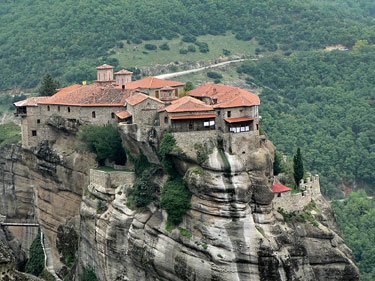
Greek Orthodox monks built 20 monasteries atop rock pillars at Meteora overlooking the Thessalian Plain, from the 10th to the 16th century, in order to get away from Byzantine politics and raiding Turks.
Wikipedia says:
Access to the monasteries was originally (and deliberately) difficult, requiring either long ladders lashed together or large nets used to haul up both goods and people. This required quite a leap of faith – the ropes were replaced, so the story goes, only “when the Lord let them break”. In the words of UNESCO, “The net in which intrepid pilgrims were hoisted up vertically alongside the 373 metres (1,224 ft) cliff where the Varlaam monastery dominates the valley symbolizes the fragility of a traditional way of life that is threatened with extinction.” In the 1920s there was an improvement in the arrangements. Steps were cut into the rock, making the complex accessible via a bridge from the nearby plateau. During World War II the site was bombed. Many art treasures were stolen.
Until the 17th century, the primary means of conveying goods and people from these eyries was by means of baskets and ropes.
Six of the monasteries remain today. Of these six, four were inhabited by men, and two by women. Each monastery has fewer than 10 inhabitants. The monasteries are now tourist attractions.
Trek Earth slide-show
From Fred Lapides.
30 May 2012


Members of the Greek Communist Party demonstrating against austerity on May Day
Brill Freeza, an American of Greek descent writing at Forbes, thinks that the left-behinds in the Old Country have a serious attitude problem and proposes an educational exercise to straighten them out.
It must be dawning on all but the most obtuse member of the banking elite that they can’t possibly steal enough money from German taxpayers to save the Greek government from default. Put it off, maybe, but collapse is inevitable.
Once this happens, what is the purpose of casting Greece into some selective temporary financial purgatory where the irrelevant Greek economy can continue embarrassing anyone foolish enough to lend their dysfunctional government a dime? Why not go all the way and give the country what many of its people have been violently demanding for almost a century?
Let them have Communism.
Hard as it is for young people to believe, Communism was once a major historical force holding billions of people in thrall. Outside the halls of elite universities, who still takes it seriously? Sure we have Cuba, where the Castro deathwatch is the last thing standing between that benighted penal colony and an inevitable makeover by Club Med. Then there is Venezuela, though hope is fading that Hugo Chavez will carry the Bolivarian banner much longer now that he’s busy sucking down FOLFOX cocktails while checking for signs that his hair is falling out. And frankly, a psychopathic family dynasty ruling a nation of stunted zombies hardly makes North Korea a proper Communist exemplar.
What the world needs, lest we forget, is a contemporary example of Communism in action. What better candidate than Greece? They’ve been pining for it for years, exhibiting a level of anti-capitalist vitriol unmatched in any developed country. They are temperamentally attuned to it, having driven all hard working Greeks abroad in search of opportunity. They pose no military threat to their neighbors, unless you quake at the sight of soldiers marching around in white skirts. And they have all the trappings of a modern Western nation, making them an uncompromised test bed for Marxist theories. Just toss them out of the European Union, cut off the flow of free Euros, and hand them back the printing plates for their old drachmas. Then stand back for a generation and watch.
The land that invented democracy used it to perfect the art of living at the expense of others, an example all Western democracies appear intent on emulating. Being the first to run out of other people’s money makes Greece truly ripe to take the next logical step beyond socialism.
Read the whole thing.
Domestically, we may need to adopt essentially the same philosophy with respect to our most pathologically deep blue states, places like California and Illinois.
Hat tip to Jim Geraghty.
11 May 2011

 
Two imagined versions of the complete Plataean Tripod
The nearly 2500 year old Platean Column at the site of the former Hippodrome of Constantinople is the surviving remnant of a victory monument erected to commemorate the defeat of the Second Persian Invasion by the Greek city-states at the Battle of Plataea in August, 479 B.C.
Originally erected as an offering to Apollo at Delphi, the Platean Tripod is the best-documented surviving artifact from Antiquity, having been written of, and described by, Herodotus, Thucydides, Demosthenes, Diodorus Siculus, Pausanias, Cornelius Nepos, and Plutarch.
It was moved to Byzantium, rebuilt and renamed by the Emperor Constantine, around 330 A.D.
The Tripod was damaged when the city fell to the Turks in 1453, as
Charles W.C. Oman describes in his The Byzantine Empire (1892):
Riding through the hippodrome towards St. Sophia, Mohammed noted the Delphic tripod with its three snakes (…) Either because the menacing heads of the serpents provoked him, or merely because he wished to try the strength of his arm, the Sultan rose in his stirrups and smote away the jaws of the nearest snake with one blow of his mace. There was something typical in the deed though Mohammed knew it not. He had defaced the monument of the first great victory of the West over the East. He, the successor in spirit not only of Xerxes but of Chosroes and Moslemah and many another Oriental potentate, who had failed where he succeeded, could not better signalise the end of Greek freedom than by dealing a scornful blow at that ancient memorial, erected in the first days of Grecian greatness, to celebrate the turning back of the Persians on the field of Plataea.
The column alone still stands today. Though most of the head of one serpent survives in the collection of the Istanbul Archaeology Museum.

Remains of the Platean Tripod Column in Istanbul.
23 Jul 2010
A song celebrating the Greek debt crisis by Merle Hazzard. 3:24 video.
(Isn’t that Iris standing on Athena’s palm?)
From Greg Mankiw via Bird Dog.
21 May 2010

Mark Steyn watches Greece arrive at the end point of the road Europe is well along, and on to which Obama has turned the United States.
From the Times of London: “The President of Greece warned last night that his country stood on the brink of the abyss after three people were killed when an anti-government mob set ï¬re to the Athens bank where they worked.â€
Almost right. They were not an “anti-government†mob, but a government mob, a mob comprised largely of civil servants. That they are highly uncivil and disinclined to serve should come as no surprise: they’re paid more and they retire earlier, and that’s how they want to keep it. So they’re objecting to austerity measures that would end, for example, the tradition of 14 monthly paycheques per annum. You read that right: the Greek public sector cannot be bound by anything so humdrum as temporal reality. So, when it was mooted that the “workers†might henceforth receive a mere 12 monthly paycheques per annum, they rioted. Their hapless victims—a man and two women—were a trio of clerks trapped in a bank when the mob set it alight and then obstructed emergency crews attempting to rescue them.
Unlovely as they are, the Greek rioters are the logical end point of the advanced social democratic state: not an oppressed underclass, but a pampered overclass, rioting in defence of its privileges and insisting on more subsidy, more benefits, more featherbedding, more government. …
Traditionally, a bank is a means by which old people with capital lend to young people with ideas. But the advanced democracies with their mountains of sovereign debt are in effect old people who’ve blown through their capital and are all out of ideas looking for young people flush enough to bail them out. And the idea that it might be time for the spendthrift geezers to change their ways butts up against their indestructible moral vanity. Last year, President Sarkozy said that the G20 summit provided “a once-in-a-lifetime opportunity to give capitalism a conscience.†European capitalism may have a conscience. It’s not clear it has a pulse. And, actually, when you’re burning Greek bank clerks to death in defence of your benefits, your “conscience†isn’t much in evidence, either.
Let us take it as read that Greece is an outlier. As waggish officials in Brussels and Strasbourg will tell you, it only snuck into the EU due to some sort of clerical error. It’s a cesspit of sloth and corruption even by Mediterranean standards. On my last brief visit, Athens was a visibly decrepit dump: a town with a handful of splendid ancient ruins surrounded by a multitude of hideous graffiti-covered contemporary ruins. If you were going to cut one “advanced†social democracy loose and watch it plunge into the abyss pour encourager les autres, it would be hard to devise a better candidate than Greece.
And yet and yet . . . riot-wracked Athens isn’t that much of an outlier. Greece’s 2010 budget deficit is 12.2 per cent of GDP; Ireland’s is 14.7. Greece’s debt is 125 per cent of GDP; Italy’s is 117 per cent. Greece’s 65-plus population will increase from 18 per cent in 2005 to 25 per cent in 2030; Spain’s will increase from 17 per cent to 25 per cent. As lazy, feckless, squalid, corrupt and violent as Greece undoubtedly is, it’s not that untypical. It’s where the rest of Europe’s headed, and Japan and North America shortly thereafter. About half the global economy is living beyond not only its means but its diminished number of children’s means.
Instead of addressing that basic fact, countries with government debt of 125 per cent of GDP are being “rescued†by countries with government debt of 80 per cent of GDP. Good luck with that. Alas, the world has deemed Greece “too big to fail,†even though in (what’s the word?) reality it’s too big not to fail. And the rest of us are too big not to follow in its path. …
Greece, wrote Theodore Dalrymple, is “a cradle not only of democracy but of democratic corruptionâ€â€”of electorates who give their votes to leaders who bribe them with baubles purchased by borrowing against a future that can never pay it off. The future is now here, and the riots will spread.
26 Mar 2009


Detain of Gigantomachy from the Great Altar at Pergamon, 2nd Century BC, Pergamon Museum, Berlin
The Pergamon Altar Piece’s Gigantomachy, a battle between the Olympian gods and the powerful, but savage, giants, celebrated the military triumph of the Greek city in Asia Minor over the barbarians by alluding to the mythical triumph of the divine forces of Reason and Order over the earth-bound powers of Cthonic Nature.
Roger Sandall marvels as contemporary political correctness brings an exhibition championing Greece’s barbarian enemy into the Pergamon Museum itself.
For too long had Hellenism been uncritically exalted in the West. Now it was time for the glory that was Greece and the grandeur that was Rome to stand aside so that we could gaze upon the je ne sais quoi that was Mesopotamia. But what exactly was Babylon? Imperial majesty? Architectural folly? A voluptuary paradise? Oriental despotism incarnate? To try to answer these questions the combined museological might of the British Museum, the Musée du Louvre, and the Staatliche Museen zu Berlin had assembled a display of things Babylonian under the title Babylon: Myth and Reality….
That distinguished and venerable classicist Peter Green apologised for having been too keen for freedom in his 1970 book Xerxes at Salamis. Revising it in 1996 under the new title The Greco-Persian Wars, he regretted embracing so enthusiastically “the fundamental Herodotean concept of freedom-under-law (eleutheria, isonomia) making its great and impassioned stand against Oriental Despotism.†What he called “the insistent lessons of multiculturalism†had forced all classical scholars “to take a long hard look at Greek ‘anti-barbarian’ propaganda, beginning with Aeschylus’s Persians and the whole thrust of Herodotus’s Histories.â€
The Oxford University Press author of the 2003 The Greek Wars, George Cawkwell, told us in a short preface that he was proud to be part of a scholarly movement that aims “to rid ourselves of a Hellenocentric view of the Persian world.†Much of the first three pages of his introduction then proceeded to ridicule and discredit Herodotus, who showed “an astounding misapprehension†concerning the Persians, whose stories were sometimes delightful but were certainly absurd, and who, he wrote, “had no real understanding of the Persian Empire.â€
But if Herodotus didn’t get it right, who exactly did? Obviously, some nameless Persian equivalent to Herodotus might have had “a real understanding of the Persian Empire,†but who was he and where is his narrative? What book by which contemporary Persian historian provides an alternative account of Achaemenid manners and customs, institutions and political thought, imperial policy and administration and ideals?
For much of the past 30 years admirers of classical Greece have been on the defensive, while easternizing admirers of Mesopotamia have been on the attack.
The courts of Cyrus the Great, Darius the Great, not to mention Xerxes, King of Kings, employed armies of chroniclers recording royal achievements and military victories. Is it conceivable that whole decades of the recent research invoked by Peter Green and Tom Holland (author of the 2005 book Persian Fire) reveal no Persian literary endeavors to compare with the achievements of the Greeks?
Alas, that seems to be the case. Even the Oxford don so jeeringly hostile to Herodotus admits that though the evidence of past Persian glories “is ample and various, one thing is lacking. Apart from the Behistun Inscription which gives an account of the opening of the reign of Darius I, there are no literary accounts of Achaemenid history other than those written by Greeks.†Moreover, he admits, such literacy as existed in the Persian Empire was largely Greek; and such writing as took place was mainly done by Greeks.
09 Mar 2009


Head of Athena Lemnia, possibly the work of Phidias
I am Pallas Athene; and I know the thoughts of all men’s hearts, and discern their manhood or their baseness. And from the souls of clay I turn away, and they are blest, but not by me. They fatten at ease, like sheep in the pasture, and eat what they did not sow, like oxen in the stall. They grow and spread, like the gourd along the ground; but, like the gourd, they give no shade to the traveller, and when they are ripe death gathers them, and they go down unloved into hell, and their name vanishes out of the land.
‘But to the souls of fire I give more fire, and to those who are manful I give a might more than man’s. These are the heroes, the sons of the Immortals, who are blest, but not like the souls of clay. For I drive them forth by strange paths, Perseus, that they may fight the Titans and the monsters, the enemies of Gods and men. Through doubt and need, danger and battle, I drive them; and some of them are slain in the flower of youth, no man knows when or where; and some of them win noble names, and a fair and green old age; but what will be their latter end I know not, and none, save Zeus, the father of Gods and men. Tell me now, Perseus, which of these two sorts of men seem to you more blest?’
–Charles Kingsley, The Heroes.
/div>

Feeds
|















